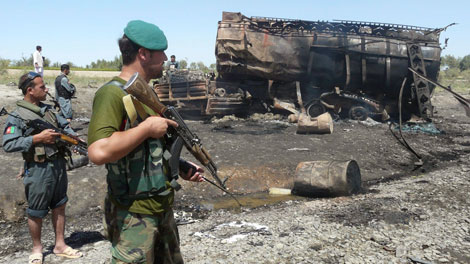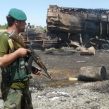
German Political Uproar After Air Strike in Afghanistan
Publication: Eurasia Daily Monitor Volume: 6 Issue: 163
By:

A German-ordered, U.S.-executed air strike, which killed scores of Afghan villagers on September 4, has caused a political uproar in Germany in the run-up to the September 27 parliamentary elections. The two governing parties are engaged in competitive damage-control. The event underscores the limitations and fragility of Germany’s commitment to the NATO-led mission in Afghanistan. It also reflects -according to German observers across party lines- the political leaders’ failure to justify the eight-year old German mission in Afghanistan to a deeply skeptical public.
On September 3 on the Kabul-Kunduz road (northern Afghanistan), gunmen loosely described as "Taliban" hijacked two fuel trucks with Afghan drivers carrying supplies for the German military’s Kunduz camp. In the pre-dawn hours of September 4, the German commander called in an air strike by U.S. planes to destroy the trucks. These were standing in a riverbed, six kilometers from the German camp, while the hijackers seemed to be distributing the fuel to a crowd of villagers. Apparently, more than 100 people were killed by the air strike; death toll reports from official civilian and military sources range from more than 70 to 130 killed (Frankfurter Allgemeine Zeitung, Sueddeutsche Zeitung, Die Welt, September 6 – 8).
Afghan President Hamid Karzai has condemned the attack with the same vehemence he has used in similar situations toward other allied forces (Le Figaro, September 7). Investigations by NATO, German, international and Afghan authorities are under way.
The incident has shocked German public opinion and derailed the parliamentary election campaign. A largely pacifist German public had been led by the main parties to believe that German troops were basically engaged in a peacekeeping and social-work type of mission, in this comparatively stable part of northern Afghanistan. By the same token German media and politicians often criticized the U.S. and British forces for resorting to air strikes that indiscriminately killed innocent bystanders along with the gunmen. Such criticism came easily as long as German troops operated under national caveats that barred offensive action, limited the use of weapons to self-defense situations, and kept the German contingent in the relatively low-risk northern Afghan provinces.
The situation in Kunduz had been deteriorating in the last year or two. German political leaders and the defense ministry, however, did not openly acknowledge this to their public, for fear that the mission would become even more unpopular than it already was. Barely three weeks before the September 4 incident the Kunduz camp commander, Colonel Georg Klein, warned in an interview that he would have to shoot at those who opened fire on his soldiers (Der Spiegel, August 17-23). The same officer called in the September 4 strike in the belief that the Taliban may well have intended to blow up the fuel trucks in an attack against the German camp, according to the most frequently cited version in German media. The Christian-Democrat-led defense ministry stands behind the officer and his decision.
The German contingent has sustained 35 fatalities in Afghanistan since 2002 -a far lighter toll compared to that suffered by other allied forces. While public opinion among NATO member countries is turning against the war due to casualties, the pacifist-inclined Germany is a different case: the war is now becoming even more unpopular due to the Afghan civilian casualties inflicted in a German-ordered air strike.
German political leaders have yet to present cogent rationales to the public for the Afghanistan mission. It was initiated by the Social Democrat-Green government in 2002-2003, as a tacit quid pro quo after the then Chancellor Gerhard Schroeder’s refusal to support the U.S. war in Iraq. Social-Democrats justified the Afghanistan mission as a "good" war in contrast to the "bad" Iraq war. The Social-Democrat then-defense minister (Peter Struck) declared that "Germany is being defended on the Hindu Kush against terrorism" -a phrase that is widely derided now. The otherwise anti-military Greens tend to support the Afghanistan mission under the rubric of humanitarian intervention; and the influential left-leaning feminist groups in both these parties endorsed the mission from that particular perspective. Angela Merkel’s Christian-Democrats- currently governing in a fractious coalition with their main rivals, the Social-Democrats- supported and ultimately inherited this mission. The Christian-Democrats are seeking a delicate balance between NATO solidarity, seen to require continuation of the mission; and political-electoral imperatives, which require avoidance of combat and a focus on civilian reconstruction in Afghanistan within German budgetary constraints.
Both major parties have done their best to exclude the Afghan war from the election campaign debates. The Bundestag prolonged the German contingent’s annual mandate in October 2008 for another 14 months, instead of 12. In this way, the mandate will be up for renewal in December 2009, that is, safely after the end of this electoral campaign.
Yet the top political leaders are now adjusting themselves to the public mood after the September 4 incident. The Social-Democrat Minister of Foreign Affairs and Chancellor-candidate, Frank-Walter Steinmeier, has proposed a road map toward German withdrawal from Afghanistan; and Merkel has now proposed an international conference to prepare a transfer of responsibilities from international to Afghan forces.




